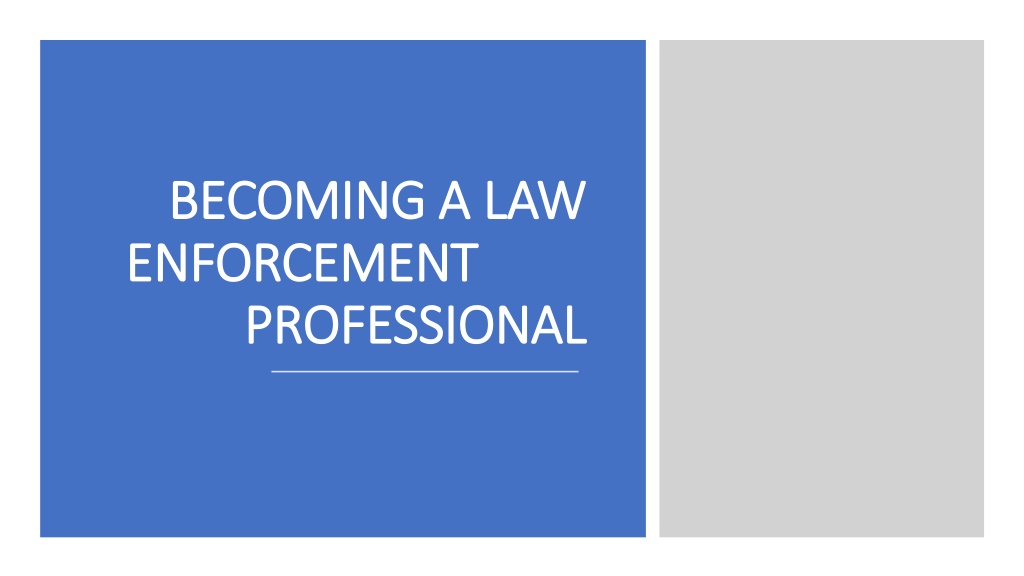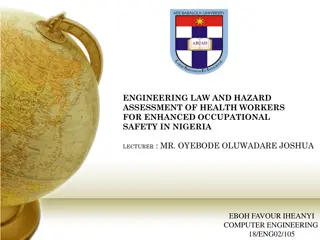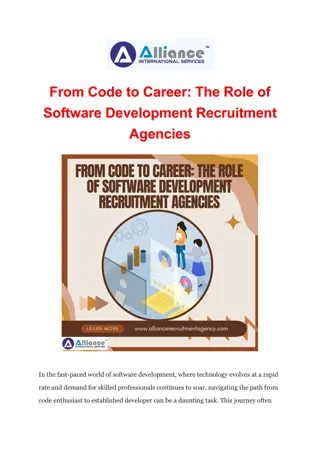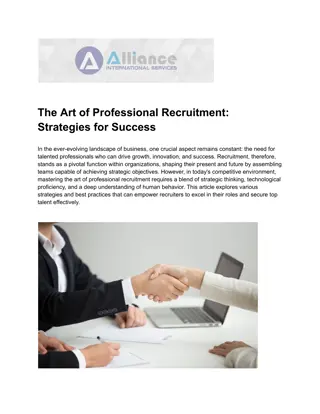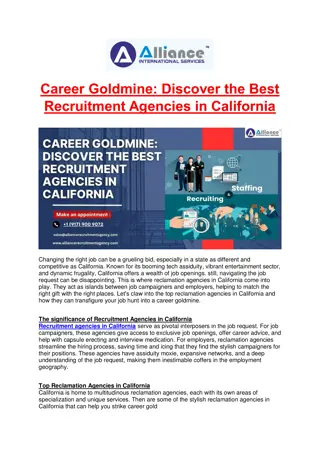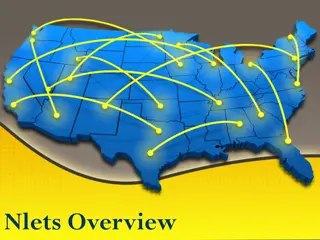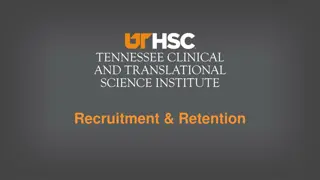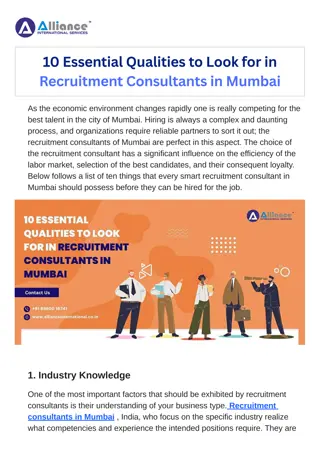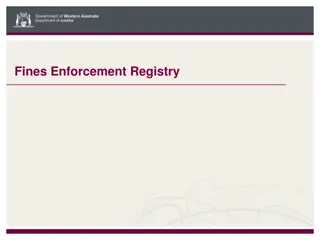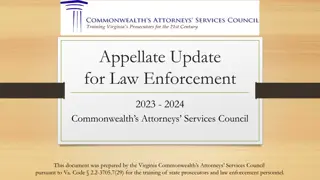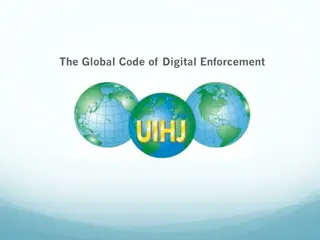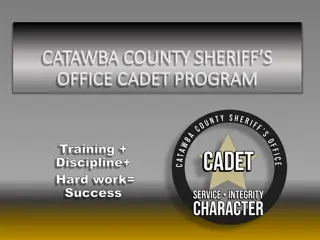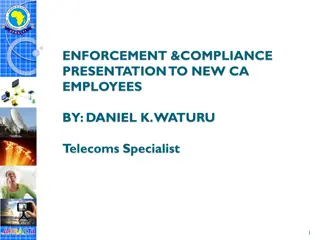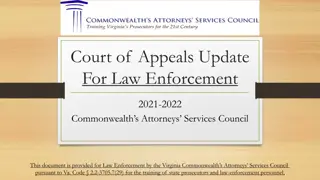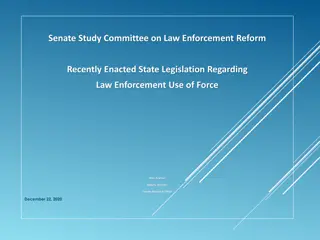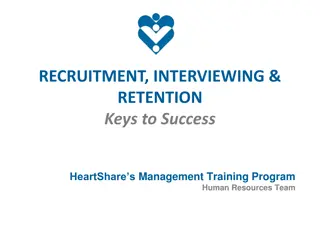Guide to Law Enforcement Career: Recruitment Strategies & Qualities
Evaluating employment agencies, desired qualities of law enforcement officers, challenges in finding qualified applicants, and effective recruiting strategies are essential elements of a successful law enforcement recruitment process. The Law Enforcement Recruitment Toolkit provides valuable insights and tools for agencies seeking to attract qualified candidates to serve in law enforcement roles.
Download Presentation

Please find below an Image/Link to download the presentation.
The content on the website is provided AS IS for your information and personal use only. It may not be sold, licensed, or shared on other websites without obtaining consent from the author. Download presentation by click this link. If you encounter any issues during the download, it is possible that the publisher has removed the file from their server.
E N D
Presentation Transcript
BECOMING A LAW BECOMING A LAW ENFORCEMENT ENFORCEMENT PROFESSIONAL PROFESSIONAL
Evaluating and Selecting an Agency for Employment Evaluating and Selecting an Agency for Employment Assess professional goals where want to work - municipal, county, state, or federal agency - small, medium or large agency - environment with high crime rate vs. little crime and limited police enforcement activity - community raised or currently resides. Other factors salary, fringe benefits, opportunity to work varied assignments in law enforcement, reputation of department and morale, promotion potential, etc.
Desired Qualities of Law Enforcement Officers Desired Qualities of Law Enforcement Officers Good law enforcement officer qualities reliable, leadership skills, good judgment, persuasive, communication skills, have initiative, honest, ego control, intelligent, sensitive and problem- solving ability. - must be U.S. citizen most states. Possibly permanent resident alien (green card holder) - must pass rigorous physical requirements - no criminal history or minor criminal history
Finding Qualified Applicants Finding Qualified Applicants Can be a challenge especially since 9/11 - expansion of federal law enforcement positions - negative publicity over high-profile incidents over racial profiling and police excessive use of force Sometimes agencies lower standards sacrificing quality for quantity i.e. individuals with prior drug use, physical fitness issues, etc.
Other Recruiting Challenges Other Recruiting Challenges Real job vs. entertainment media, enticement of opportunities by other professions. Other challenges retirement of older officers, recruiting those who view as calling vs. job .
Recruiting Strategies Recruiting Strategies - Advertisement on websites - Personal Contact - Newspaper Ads - Referral incentives to recruiting officers after new recruit completes policy academy * Colleges fundamental source
The Law Enforcement Recruitment Toolkit (2009) The Law Enforcement Recruitment Toolkit (2009) By IACP: 4 main sections: - Police Recruitment: Foundation Concepts - Recruiting for Diversity - Agency Collaboration in Police Officer Recruitment and Selection - Community Partnerships in Police Recruitment
Recruiting for Diversity Recruiting for Diversity Diversity vital to law enforcement s continued success. Racially balanced police department fosters community relations and increases police effectiveness. Recruiting minorities Recruiting minorities improve relations with communities with minorities. Recruiting women Recruiting women less apt to use excessive force, reduced problems with sex discrimination, improve agency s response to violence against women, help implement community-oriented policing
The Importance of Hiring Well The Importance of Hiring Well Hiring process critical in law enforcement. Vicarious Liability Vicarious Liability legal responsibility one person has for the acts of another. Negligent-hiring litigation becoming more common. Liability for negligence in hiring personnel unqualified or unsuited for law enforcement work.
The Selection Process The Selection Process multiple hurdle process multiple hurdle process - Formal application and resume - Written examination - Physical fitness test - Psychological Examination - - At least one oral interview, possibly more - Thorough background investigation, possibly to include a polygraph test - Medical Examination
The Formal Application The Formal Application Basic Requirements to Become a Police Officer Basic Requirements to Become a Police Officer - U.S. citizen - Driver s license possibly chauffeur s license - No felony conviction Education Education - - high school - 2 year or 4 year college degree Residency Residency some agencies require residency in the community
The Written Examination The Written Examination Test varies abilities reading, comprehension, ability to process information, problem- solving skills, writing skills, grammar, spelling, and interpersonal communication skills. Test usually takes 2-3 hours. Usually pass/fail situation.
Physical Fitness Tests Physical Fitness Tests Determines whether candidate is in good physical condition. Evaluates coordination, strength and speed. 2 types of tests: - Physical Qualifications Test (PQT) timed-minimum physical standards, i.e. sit-ups, push-ups, a run - Job Standards Test (JST) job-related scenario activities, i.e. running up stairs chasing someone, physical restraint simulation, etc.
Psychological Testing Psychological Testing Psychological test is given to see if person is emotionally suited for law enforcement career. Tests usually given are personality inventories Minnesota Multiphasic Personality Inventory -2 (MMPI-2), California Psychological Inventory (CPI), the Myers-Briggs Type Indicator, the Watson-Glaser Critical Thinking Appraisal and Strong Interest Inventory
The Interview The Interview Usually conducted by a panel (3-5 skilled interviewers) - Appearance - Alertness - Communication Skills - Social Adaptability - Judgment - Emotional Stability - Interest in Job - Suitability for Job
The Background Investigation The Background Investigation serves 2 purposes serves 2 purposes Examines and verifies past work and education Determines if anything in the background might make candidate unsuitable for law enforcement work Criminal records checks Financial records/credit checks Military records Foreign Travel (federal law enforcement) Interviews - personal references, neighbors, employers, etc. Pending litigation Past performance
Testing or Assessment Centers Testing or Assessment Centers Companies/Centers that assist with selection as well as promotion of law enforcement candidates. Use job-related simulation exercises (situational testing). Evaluates individual judgment, decision-making and physical reflexes.
The Medical Examination The Medical Examination Determines whether candidate is medically fit. Visual, hearing and cardiovascular-respiratory system most important. High cholesterol, high blood pressure, smoking, drug use, diabetes, etc.
The Final Result The Final Result All of the tests are reviewed and determined the suitability of the candidate for the position. Federal Guidelines and Regulations Federal Guidelines and Regulations General rule - all requirements must clearly job related. Bona fide occupational qualification (BGOQ) Bona fide occupational qualification (BGOQ) skill or knowledge that is reasonably necessary to perform a job and may be a requirement for employment.
Equal Employment Opportunity (EEO) Act (1972) Equal Employment Opportunity (EEO) Act (1972) Prohibits discrimination due to sex, race, color, religion, or national origin in employment of any kind, public or private, local, state or federal. Restricts application forms from asking questions pertaining to sex, race, color, religion, national origin, age, marital status, ages of children or if person was arrested. (Can include conviction of crime.)
Affirmative Action Affirmative Action special provision applied to Equal Employment special provision applied to Equal Employment Opportunity Commission (1973) Opportunity Commission (1973) Results-oriented to ensure equal employment for minorities and women. Griggs v. Duke Power Company (1971) Supreme Court ruled racially- based quotas violated federal law. Reverse discrimination Reverse discrimination discrimination against white males. Ricci v. DeStefano (2009) involved reverse discrimination issue damned if you do and damned if you don t predicament
Americans with Disabilities Act (ADA) (1990) Americans with Disabilities Act (ADA) (1990) Guarantees equal opportunity to jobs for qualified individuals with disabilities. Conditions excluded from protection: current use of illicit drugs, kleptomania, compulsive gambling, pyromania, sexual behavior disorders and disfunctions, pedophilia, voyeurism, exhibitionism, and psychological disorder caused by current use of illicit drugs. ADA prohibits application process from asking questions regarding disability.
Probation and Training Probation and Training Probationary period is a trial period average is 1 year. Training is required, and number of hours for training is also required. Civil lawsuits regarding training and law enforcement 2 categories - failure-to-train litigation can be held liable for lack of training/adequate training (shooting, use of force, etc.) - civil liability for injuries sustained during training assumption- of-risk defense bars liability if person injured as result of normal dangers associated with activity volunteers for.
Retention Retention Challenge of keeping law enforcement officers. High turnover rates. Why Officers Leave Why Officers Leave Reasons given when asked: Life changes marriage, birth of child, etc. Prolonged disappointment regarding lack of promotion Better job opportunity elsewhere Early retirement or transfer benefits
Other reasons given: Uncompetitive salary Lack of career growth Poor job fit Dysfunctional department culture Salary and Benefits Salary and Benefits Salaries vary throughout the country Fringe benefits include hospital and dental plans, insurance, vacation, sick leave, holiday pay
Elimination of Sexual Harassment Elimination of Sexual Harassment Rising issue for women in law enforcement Sexual harassment defined unwelcome sexual advances, requests for sexual favors, and other verbal or physical conduct of a sexual nature . 2 legally recognized types of sexual harassment: Quid pro quo harassment Quid pro quo harassment employer s demand for a sexual favor in return for a benefit for the employee Hostile Hostile- -environment harassment environment harassment employee perceives work environment is antagonistic, hostile, intimidating because of actions of a coworker or supervisor/employer
Stress and Burnout Stress and Burnout Stress positive and negative positive excitement of job negative demands of the job acute short-term chronic long term Change/uncertainty daily part of life of law enforcement never know what to expect Lack of Control not in control of suspects arrest can be released by court Pressure lots of paperwork, expectations by public Shift work not stable work hours
Critical incidents event that elicits overwhelming emotional response from those witnessing it Burst stress go from relatively calm to high intensity, sometimes life threatening activity Split-second syndrome if person has intentionally/unintentionally provoked police officer, provoker should be viewed as cause resulting with injury or damages Post-Traumatic Stress Disorder (PTSD) psychological illness happens after highly stressful event or series of events.
Burnout results from long-term unmediated stress. Strategies that help alleviate burnout physical exercise adequate sleep good nutrition social outlets relaxation techniques time management Long-term stress is destructive and may be fatal
Divorce rate high, alcohol abuse, isolation from family/friends , extreme emotional outbursts, etc. Retention Strategies Retention Strategies Providing realistic job previews, behaviorally-based interviews at hiring phase Managers providing more training, recognition, feedback, career assessments and counseling
Unions Unions Law enforcement officers organized/join labor unions to protect their interests. Labor unions have helped to provide numerous benefits, such as increased wages and fringe benefits and other conditions of employment. Collective bargaining Collective bargaining representatives of employees meet with representatives of management to establish a written contract for working conditions.
Moonlighting Moonlighting - - working part-time while working a full-time job also. Controversial and handled differently in different departments. Accreditation Accreditation Being approved by an official review board as meeting specific standards. Commission on Accreditation for Law Enforcement Agencies (CALEA) (1979) develop professional law enforcement standards and to administer a voluntary accreditation process.
Credentialing Credentialing process where individual police officers are evaluated and approved by the National Law Enforcement Credentialing Board (NLECB) as meeting certain standards. NLECB established by the Fraternal Order of Police, which is the oldest, largest and most influential law enforcement organization (1915) Controversial obstacle is Peace Officer Standards and Training (POST) boards.
Police Professionalism Police Professionalism Sociological Elements of Professionalism Sociological Elements of Professionalism 3 key elements knowledge, autonomy and a service deal knowledge, autonomy and a service deal 3 key elements specialized specialized Specialized Knowledge Specialized Knowledge police departments now require a 2 year or 4 year college degree. Skills training also provided Autonomy Autonomy law enforcement has ability to control entrance into the profession. Peace Officer Standards and Training (POST) Boards A Service Deal A Service Deal follow formal code of ethics and be committed to serving the community
